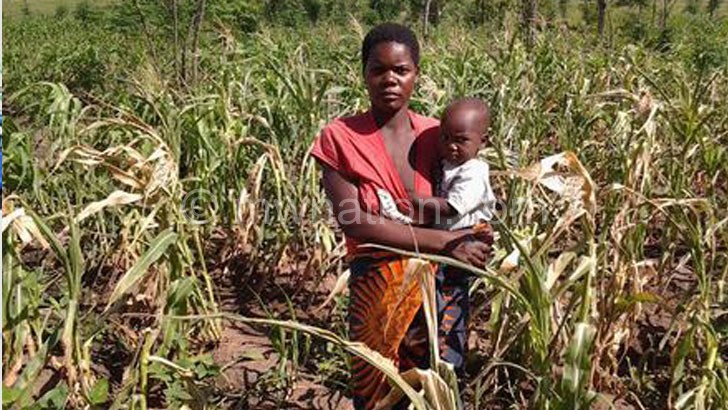Govt to import GM maize
Some agricultural experts have warned government against importing maize from countries with genetically modified (GM) history. But the Malawi government which has appealed for emergency relief food aid has said if it buys or accepts maize donations from countries with GM history, it will mill it at the point of entry.
GMOs are genetically modified organisms in which the genetic material, DNA, has been altered in a way that does not occur naturally by mating or by natural recombination.

Government estimates that it needs to import 1.07 million metric tonnes (MT) of maize to feed about 8.8 million people facing food shortage due to the El Nino weather episode which has decimated maize harvests this year. Maize harvest this year is 12.4 percent lower than last year when the country harvested 2.9 million MT against a national requirement of 3.2 million MT.
Against this background, President Peter Mutharika in March this year announced a state of national disaster aimed at making well-wishers assist the country with food aid.
With the region facing a similar maize shortage, Minister of Agriculture, Irrigation and Water Development George Chaponda said last month government will also buy maize from countries such as Brazil, Mexico, Ukraine and the Caribbean, among others. Some of these countries have a history of GM including white grain maize.
Government’s decision to mill the maize at the point of entry is to allay fears by some agricultural experts who argue that accepting genetically modified maize can pose long term impact on crops and hurt farm produce.
The experts from the farmers organisations in the country who asked not be mentioned, said while GM maize has no harmful effects on human beings, however, warn that the country cannot handle the effects that would come with poor handling of the GM maize which some people would use as seed. They fear that the planted maize would introduce weeds and insects in the country and which would become resistant to pesticides and herbicides.
Their fear comes against the background of rampant theft of public resources such as drugs. A third of drugs for public health facilities are stolen—90 percent of them at the health facility level and 4 percent before the drugs get to the health facilities.
The experts are worried that some imported maize may be stolen before it is milled at the point of entry and later planted as seed.
But Chaponda who confirmed to Weekend Nation on Thursday that government plans to import maize from Brazil and Mexico, said government will make sure the maize is milled at the borders to avoid contamination with maize seed in the country.
Government says with more than 8.8 million people in need of food aid, it will not be stopped from importing maize whether or not from GMO countries just because there is fear of GMO maize.
Minister of Finance, Economic Planning and Development Goodall Gondwe presented the 2016/17 budget on May 27 which allocated K198 billion to the Ministry of Agriculture of which K35 billion will be for importation of relief maize.
This year, government imported 30 000 metric tonnes (MT) of maize from Zambia following last year’s low crop harvest of 2.9 million MT against the national requirement of 3.2 million MT. This year Malawi expects to harvest 2.4 million MT of maize.
Civil Society for Agriculture Network (Cisanet) executive director Tamani Nkhono-Mvula while appreciating the importance of guarding against importing maize from countries with GMO history, said the move was also very sensitive.
Nkhono-Mvula warned that as Malawi is planning to import maize from countries such as Brazil and Mexico, there is indeed a high probability that the maize may be GM as these countries are GMO growing areas.
He, however, said this will not be the first time Malawi has imported GM maize citing the 2000/2001 food crisis when Malawi accepted GM maize from South America.
Said Nkhono-Mvula: “There has been a lot of talk about the effects of GM foods on human health and why we should not eat such type of maize. I may not be an expert on that but one thing that we have to know is that the country is in a crisis with almost half the population facing hunger.
“The whole region where we can get guaranteed GM-free maize is also facing a crisis, so what should we do to save the lives of people?” he wondered.
Nkhono-Mvula, however, noted that people who ate the GM maize during the 2000/2001 food crisis are still alive and well today.
“The choice that we have now is to die today of hunger or die tomorrow of whatever GM maize we will bring. What I am trying to say is we should not fear to import maize from Brazil, or anywhere, because it is people’s lives that are at stake here. I think it’s better to eat GM maize than to eat poisonous root tubers that people sometimes eat during food crises of this nature,” he said.
Government through the ministries of Trade and Industry and Agriculture has announced that it has started regulating the buying of maize from farmers in an effort aimed at preventing vendors from buying and hoarding it with a view to selling it at exorbitant prices later in the year. n






Mr Chaponda the old man, the same old man who wanted to introduce the Ziphwisi bill, and yes the same old man who pumped while fast asleep in parliament……….how are you going to mill the GM maize at the point of entry?
Does Malawi have maize milling machines at her point of entries………….and how long is it gonna take to mill thousands & thousands of metric tonnes of GM maize? & how about packaging? Do you have packaging for the flour after milling?
Does this Chaponda guy have a head?…………This is why people can never trust Malawian politicians its a waste of time…………..